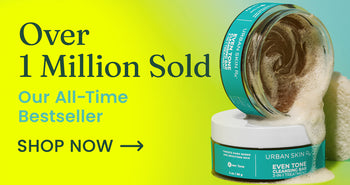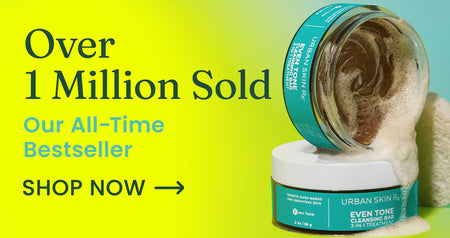Best Face Wash for Acne: What Ingredients Should You Be Looking For

If you’re prone to acne and pimples, a good face wash can be the holy grail. Especially if your breakouts are due to oily skin, washing your face in the morning and the evening can leave you feeling like a totally new person — but it doesn’t necessarily get rid of your acne and blemishes.
Sometimes, cleansers that leave you feeling the cleanest aren’t actually the best for your acne-prone skin.
If your cleanser formula is too intense, it can strip your skin of oil so thoroughly that your sebaceous glands start producing more oil to compensate… leading to more breakouts. Not to mention the fact that while a good cleanser is key for fighting your breakouts, it isn’t the only stop you're going to need to make on the road to clear skin.
You might need to incorporate other products into your routine to fight your acne effectively but a good facial cleanser really is the cornerstone of your breakout-busting regimen.
If you want to find the best face cleanser for you, you’re going to have to go slightly beyond internet reviews and word-of-mouth recommendations. The best way to find a good product is to do your research — learn about the ingredients and look for a face wash that includes all of the building blocks you want it to have to give you your freshest face yet.
What Ingredients Should You Look For?
It can be tempting to google “what’s the best face wash for acne-prone skin” and quickly order the first result. But if you’re serious about getting your skin the help it needs, you’re going to want to learn a little bit about what makes these products work. Especially considering the number of over-the-counter acne products on the market, it’s great to be able to discern what’s real and what isn’t!
By understanding some of the key ingredients you should look for when you’re trying to find a face wash to help you get your breakouts under control, you’ll be able to better determine the best acne face wash to use.
Different skin types can be sensitive to varying ingredients like fragrances or sulfates — if you try a new product and it irritates your skin, it’s helpful to know what the active ingredients are to avoid them in your next choice.
Salicylic Acid
One of the most commonly used ingredients in facial cleansers formulated for fighting acne is Salicylic Acid.
Salicylic Acid is a Beta Hydroxy Acid, not to be confused with Alpha Hydroxy Acid, which is similar but not the same. BHAs like Salicylic Acid are great when treating acne and breakouts because they’re chemical exfoliants.
Chemical exfoliants help slough away your outer, older layer of skin. This also helps keep your pores clear of excessive sebum, which can improve the appearance of breakouts and prevent your next one from occurring in the first place!
Salicylic Acid is available in many drugstore products over-the-counter. It’s also available in prescription strength, so if your acne is really taking a toll on your mental health and you’re worried about scarring, it’s worth speaking to your doctor or dermatologist about a prescription-strength face wash.
Salicylic Acid is particularly potent when dealing with blackheads and whiteheads. Whiteheads particularly occur when dirt and grime get trapped in a closed pore, so Salicylic Acid can be a real hero with those by helping to get rid of old, dead skin and just generally opening things up and refreshing your face.
Our Clear Skin Cleansing Bar uses Salicylic Acid to help refresh and improve your complexion, along with soothing ingredients like Eucalyptus Oil to make sure you’re left feeling clean but not stripped.
Glycolic Acid
Similar to Salicylic Acid, Glycolic Acid is an Alpha Hydroxy Acid. It’s a great ingredient to look for on the label of your acne-fighting face wash! Alpha Hydroxy Acids are also chemical exfoliants.
Glycolic Acid breaks down the bond between layers of your skin cells, which results in a sort of peeling effect — that’s why Glycolic Acid is also a common ingredient in chemical peels.
The exfoliating effect of Glycolic Acid resurfaces your skin and removes a lot of the gunk and junk that can get stuck in your pores, causing a breakout. It’s also good for getting rid of excess oil on your skin. And while Glycolic Acid applied in serum form can tend to dry out your skin, using it in a face wash shouldn’t be too harsh and drying.
In fact, Glycolic Acid can actually help your outer layer of the skin retain moisture — so if you’re pursuing other acne treatments, like a spot treatment or face mask, using a face wash with Glycolic Acid can help to prevent those products from becoming too drying— especially if you have sensitive skin.
Lactic Acid
Lactic Acid is another common ingredient for fighting current breakouts and discouraging future ones.
Like Glycolic Acid, it’s categorized as an Alpha Hydroxy Acid, which means it’s a chemical exfoliant that helps to encourage cell turnover and remove old, tired skin cells from your face to enable your true glow to shine through.
Because acne is often caused by a buildup of dirt or leftover makeup or other bits that accumulate on your face throughout the day, refreshing the surface of your skin can go a long way toward fighting your breakouts and evening out the appearance of your complexion overall.
Lactic Acid is the perfect acne-fighting component to a face wash or foaming cleanser because while you want your skin to feel squeaky clean, you don’t want your face wash to leave you feeling tight and dry. This can make your skin prone to even greater irritation as you apply other products. You want to start with your best foot forward! Luckily, Lactic Acid is also a humectant, which is to say that it’s good for keeping your skin hydrated.
Especially if you’ve maybe had a bad reaction to other Alpha Hydroxy Acids in the past, Lactic Acid might be a good one to try. It’s gentler on your skin than other AHAs. Something about its molecular structure (blah blah blah, science) makes it easier for all skin types to handle.
Benzoyl Peroxide
Benzoyl Peroxide is another usual suspect for ingredients that are great for fighting breakouts. Like Salicylic Acid, it’s available both over-the-counter and in a prescription-strength treatment. Which one you should use just depends on how severe your acne is and what your doctor or dermatologist recommends.
Benzoyl Peroxide is a killer for reducing blemishes — literally. It kills germs that may be hiding within your skin and flushes out dead skin cells and oil that may be clogging your pores and causing, or worsening, your breakouts.
While Benzoyl Peroxide is really effective, it’s most effective for certain types of acne.
Benzoyl Peroxide is going to be your best friend if your acne is especially irritating, which is to say, the more aggressive kind. We’re talking pustules; we’re talking cysts; we’re talking papules — if your acne makes your skin red and (sorry) full of pus, Benzoyl Peroxide is for you. It’s often prescribed to reduce Cystic Acne since it leads to scarring more often than other types of acne.
Less irritating types of acne present as blackheads or whiteheads. If your breakouts tend to be more whiteheads and blackheads than anything else, Benzoyl Peroxide may help — and it definitely will if you experience a bit of both types of breakouts.
What’s the Best Way to Wash Your Face?
While there’s some minor debate so far as to how often and thoroughly you should wash your face when you have breakouts, you’re definitely looking at a twice-daily routine.
Once in the morning before you apply any other skincare products, and once in the evening so that you don’t take the dirt and sweat of the day with you to bed.
You’ll want to use the face wash you’ve chosen to help you fight breakouts, whether it be cream cleansers or a face wash with BHA or AHA. That said, it’s possible that if your skin is both dry and breaking out, washing your face with a strong face wash twice a day might be too much for your skin.
If your face-washing routine starts to result in redness and flaking, you can dial it back. Use your medicated face wash in the evening; when your face is most likely to have picked up any nasty bits you’ll want to scrub off before bed.
You can use a gentler cleanser in the morning — even something as low-key as micellar water. You’re not likely to have picked up a crazy amount of grossness while you were asleep (we hope…), so chilling out a little bit when it comes to the intensity of your face wash in the morning shouldn’t be a big deal.
Especially if you live somewhere that gets cold around this time of the year, it can be tempting to turn your faucet up as high as it goes before you wash your face. Sorry to disappoint, but you’ll want to keep the water lukewarm! This will be gentle on your skin but not so cold that it makes your pores constrict. You want your face to be relaxed, basically, so the ingredients of your face wash can have the best effect.
When you were a kid, you were probably told to sing your ABCs while you wash your hands — we’re going to tell you the same for your face! You’ll want to massage your cleanser with lukewarm water into your face for about the length of the alphabet.
You can wash your face using your hands or a washcloth, but if you opt for a cloth, you’ll want to make sure the cloth is really soft and designed to be gentle on your skin. If you’re trying to treat your acne, your skin is probably already pretty irritated— you don’t want to make it worse with an old, scratchy towel.
Afterward, you’ll splash more water on your face like you’re in a skincare commercial and gently pat it dry with a clean towel. Clean is key — we’re not talking about that hand towel your roommate hung on the rack the day you moved in and forgot about. If you need to keep a special stack of washcloths for your face, it’s worth it!
What Do You Do Next?
While finding the right facial cleanser to help you banish blemishes is key to your skincare routine overall, you may be wondering how using a face wash that has blemish-fighting properties will affect the rest of your routine. The short answer is, it depends on your personal skin!
If you’re really struggling with breakouts, it’s worth making an appointment with a licensed dermatologist. Because many blemish-fighting ingredients are available in prescription strength as well as over-the-counter, you may find you’re better off with prescribed products. Or you might just want some expert advice when it comes to shaping your routine. Whatever the case, there’s never any harm in asking for help!
After you’ve washed your face, you can follow up with serum if that’s something you already include in your routine or would like to include. Depending on which ingredients were in your face wash, this serum could feature AHAs or BHAs, too.
Another great option to give your skin a bit of a boost is incorporating Retinols into your routine. We like to use Retinol serums at night, before our night cream, so it has time to work its magic uninterrupted. While we usually think of Retinols as products that help us age gracefully, they’re great for resurfacing your skin, which you need if you’re recovering from a breakout. Niacinamide is another great option that has soothing properties and is useful when balancing out your skin’s oil production.
The other two types of serums we’d recommend considering are Vitamin C serums, which help even out your skin tone and brighten your complexion, or products containing Hyaluronic Acid, which can give your skin the burst of hydration it needs after being washed with potentially drying ingredients.
After your serum, you can apply a moisturizer! While using a serum is advised, it’s totally optional. But moisturizing after you’ve washed your face — especially when that face wash includes AHAs and other ingredients that might leave your skin a bit high and dry — is non-negotiable. You simply must!
During the day, a light, non-oily moisturizer will be great. At night, if you want to give yourself a little extra love, a thicker, richer moisturizer is the ticket. Leaving it on overnight gives it time to replenish your skin without having to go through the day feeling heavy and greasy.
It’s also important to finish your morning routine with good SPF! Some of the ingredients we mentioned, like AHAs, can make your skin more sensitive to the sun.
Since avoiding undue sun exposure is one of the best ways to keep your skin healthy and glowing, it’s best to apply SPF every single day, no matter how tempting the “glow” of a fresh tan might be. Even if it doesn’t look sunny outside, applying SPF is important. This will help keep your skin from drying out, getting more damaged in a way that’s likely to lead to scarring, and also reduce premature aging — so it’s a win-win all around.
In Conclusion
It can be hard to find a face wash you love and even harder when your skin has very specific needs. If you’re struggling with acne and breakouts, it might be time to learn about the ingredients in certain face washes that help out your specific skin type. By starting your skincare routine with some great acne-fighting ingredients, you’ll be headed in the right direction to clear up your skin!
Service Representative



